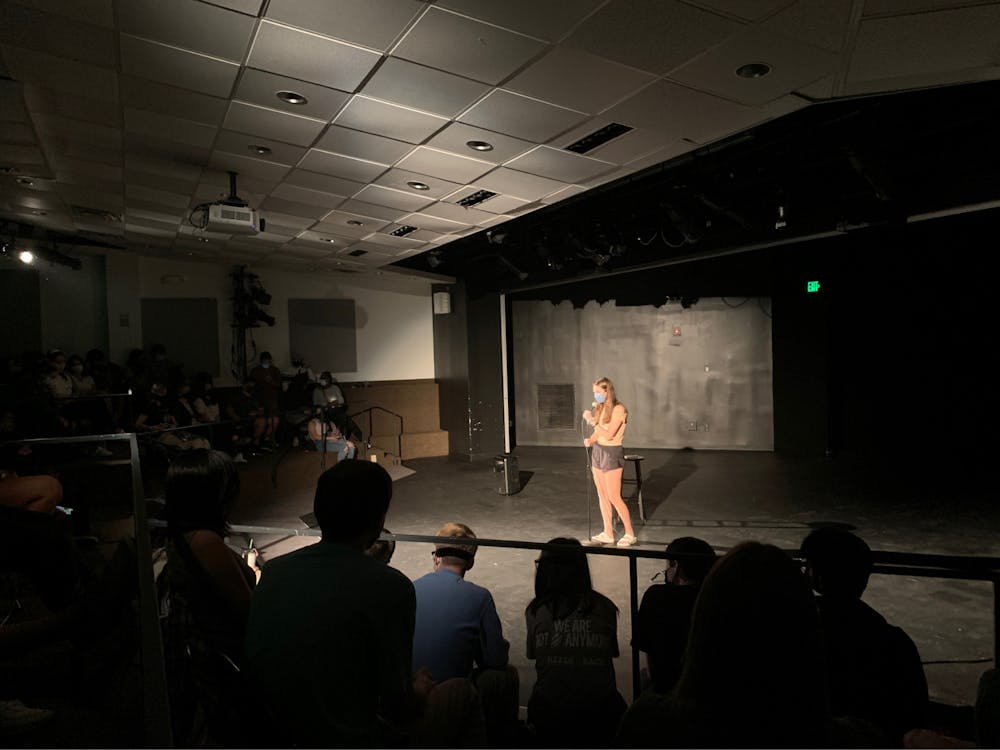Last Friday, the Hopkins Stand-Up Comedy Club (SUCC) gave it their all at their first show of the season, “Stand-Up Comedy Show: The Bird Election.” Just before 9 p.m., audience members filled Arellano Theater, in search of an evening comedy fix. Some stood against the wall, while others sat on the ledges overlooking the stage. A lucky few got to sit in chairs, looming over their deposed counterparts. Some people were even turned away from the crowded venue once it reached full capacity. The atmosphere was charged with excitement.
The lights darkened, and the president of SUCC, senior Kyra Rothwell, gave an energetic introduction. She transitioned into her set, full of lightly delivered jokes with dark and morbid subject matter. She talked about the mass fascination with true crime and its victims as well as an “unrelated” hiking trip she took alone over the summer. Her performance established an easy familiarity with the audience for the rest of the performers.
Rothwell opened up about some behind-the-scenes obstacles that the club had faced.
“We had a lot of physical and technical challenges leading up to the show and even had to borrow a mic cable from the Zella Day concert, so I am very impressed by how calm and collected our new performers were,” she said.
A little bit of drama never hurts, right?
The rest of the performers delivered stand-up on stage for their first time. The combination of nervous energy and fresh material made for an engaging hour of comedy. Before each new performer took the stage, there was a tenseness in the air, derived from a shared sense of anticipation. Without fail, however, each performer completed their sets with minimal missteps. It was an impressive feat of courage.
Freshman Tory Hu delivered a riotous and hilarious set about the divergent treatment of arts students at Hopkins compared to students of other majors. She pointed out that enrollment limits for arts classes outside of Homewood Campus are often capped at 15, but there are only 10 seats on the shuttle. She also daringly retold a dangerous, hate-ridden incident that occurred recently to her and a friend. The accumulation of her sharp observations mounted into a well-developed set, filled with callbacks. Her delivery was effortless and captivating, giving the difficult subject matter an extra punch.
The rest of the performers also brought their own original style to their sets, and their personalities were clear in the mere sub-10-minute period. The comedians skillfully developed their own voices by keeping their sets personal. It made the show seem all the more human and relatable. Each performer managed to scrounge a laugh from their guarded peers in the audience. The energy they exuded was contagious and brought the room to life.
After the show, Rothwell highlighted the important differences between performing in-person versus online.
“The energy in the room was high, and everyone fed off of it for the whole night,” she said. “It is much more intimate and real compared to being online. Telling jokes to a computer screen just doesn’t have the same effect as a room full of people.”
An interesting pattern that appeared within the vast majority of the sets was a focus on whether or not the performer was having sex or in a relationship — two things that are, of course, not mutually exclusive. More than one performer focused on their distinctive singleness. They pointed to examples of their relationship status, like performing stand-up on one’s birthday. Previously unscathed species were given sexual connotations (to quote graduate student Haley Tarbox, “Cicadas have a raw sexual energy”).
Perhaps the prominence of the sexual subject matter in the show was due more to the expected interests of the audience than the preoccupations of the performers themselves. It is well known that sex sells; it’s an effective way to engage a skeptical audience.
The official mission of SUCC is, “To spread laughter and understanding throughout campus and the great cosmos.” Their first show certainly achieved at least a portion of that. The night was indeed filled with laughter. The intelligently composed sets about race, sexuality, gender and existential ponderings created a space for audience members and performers alike to think more broadly about the universe surrounding them. Thankfully, stand-up comedy is back.





